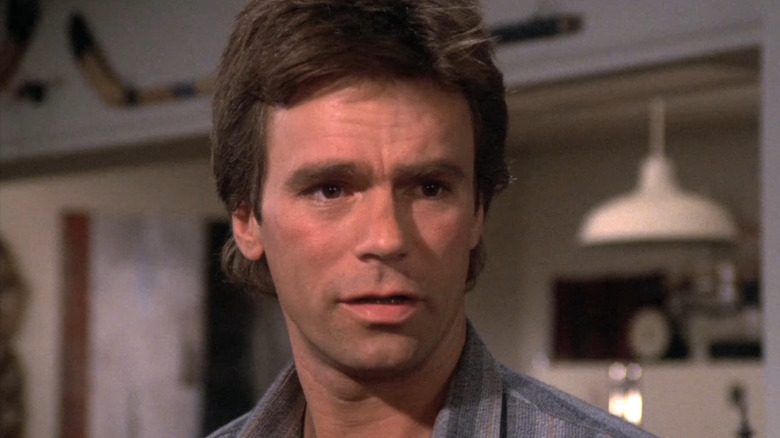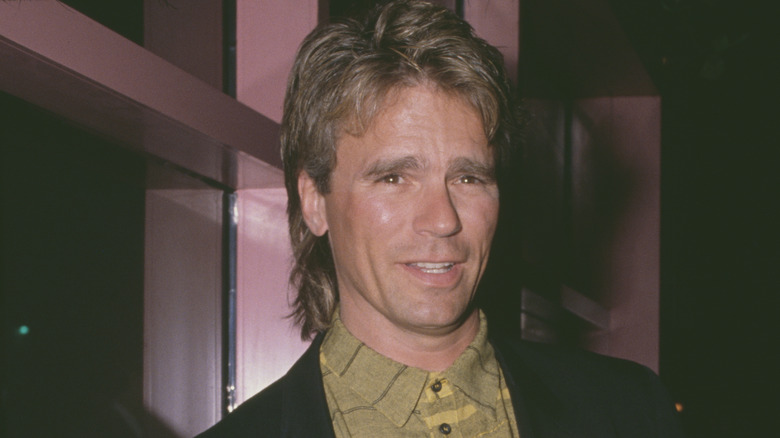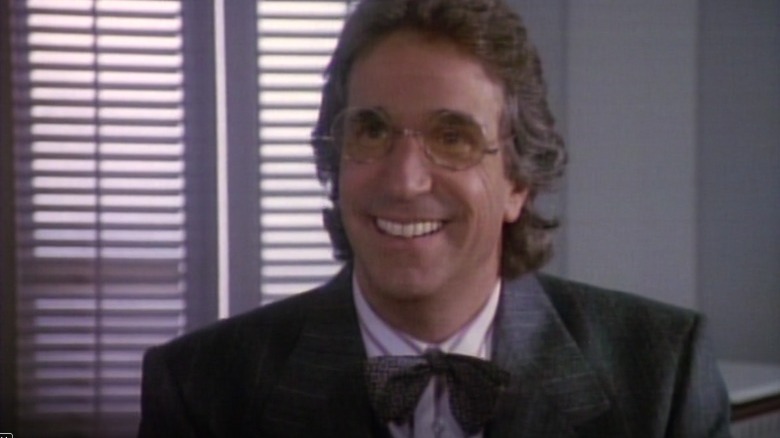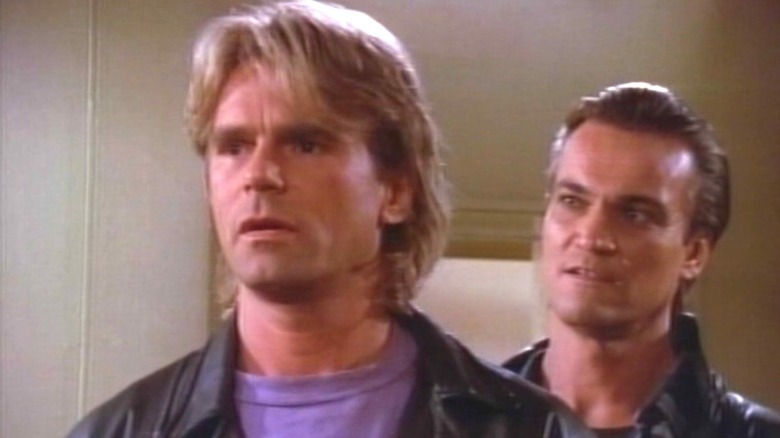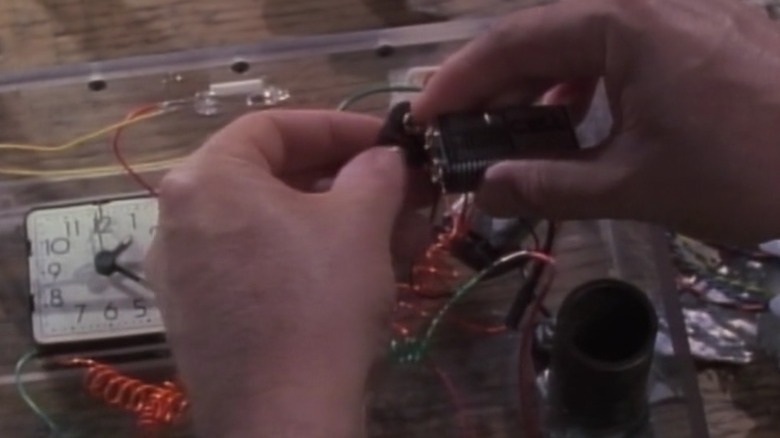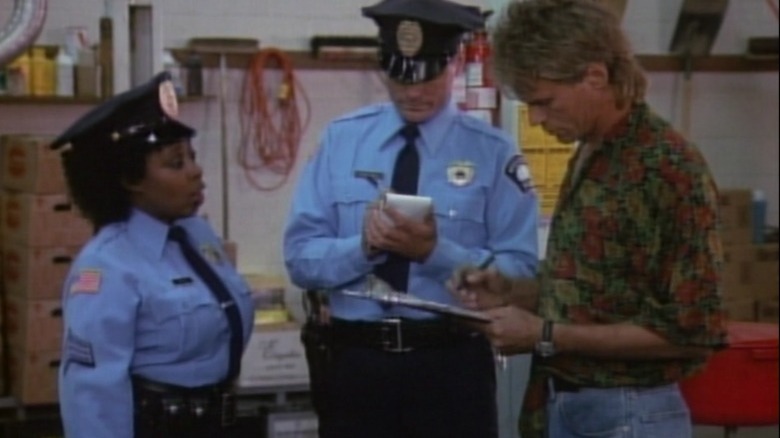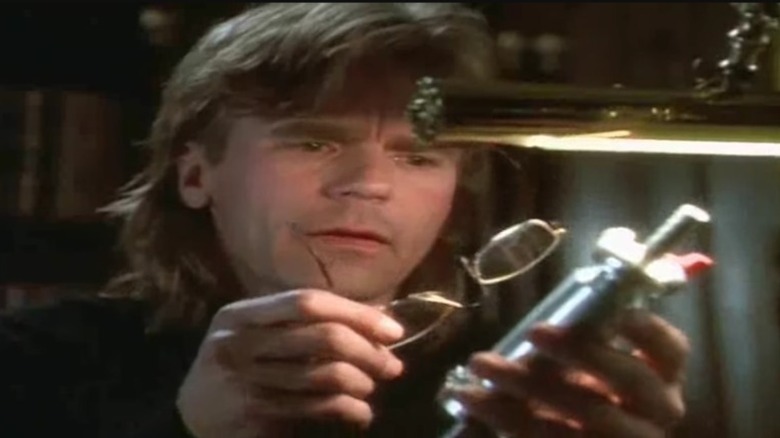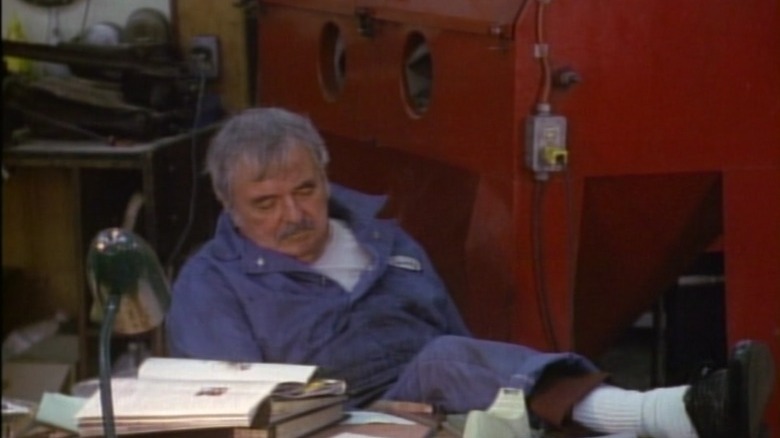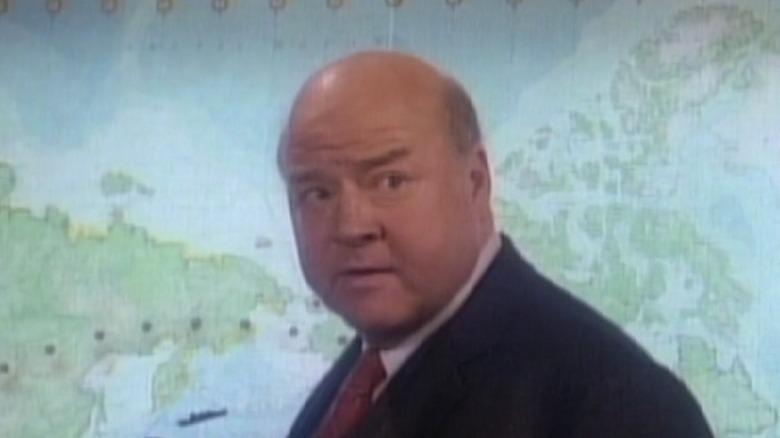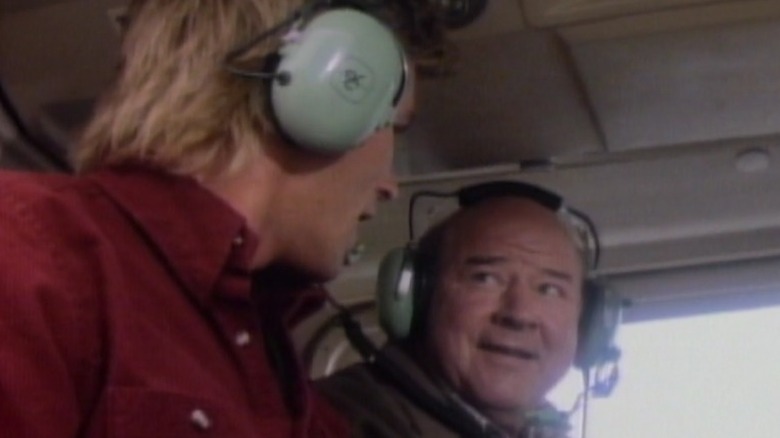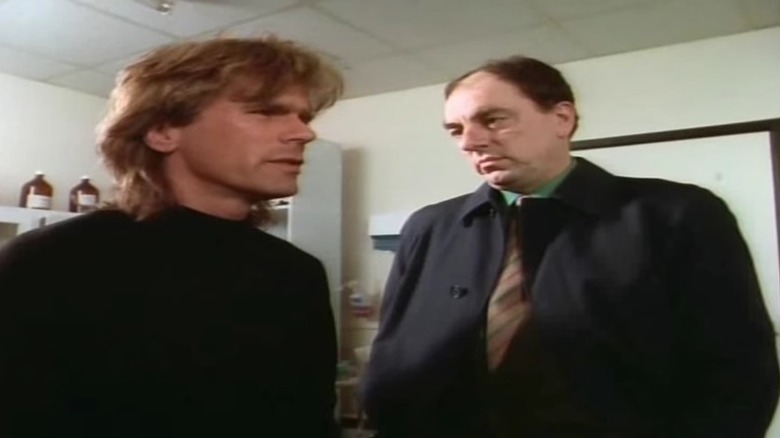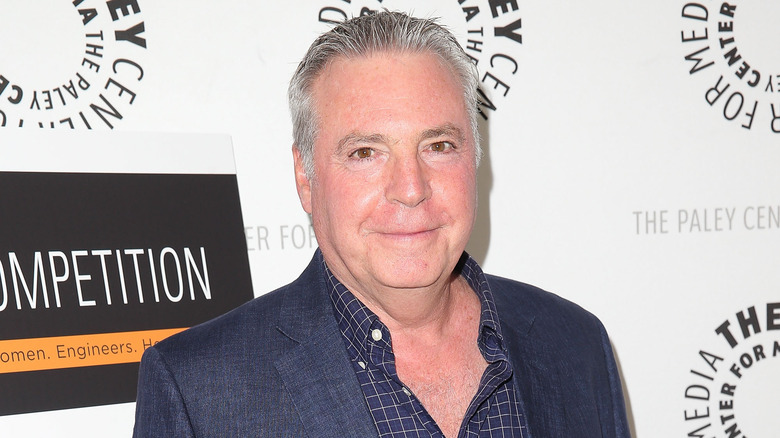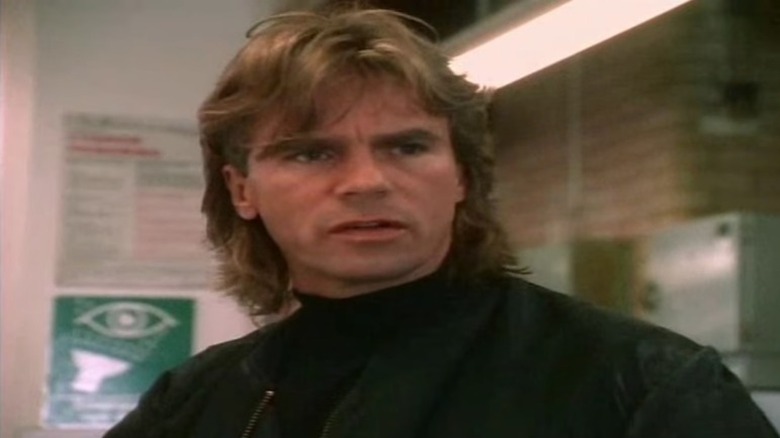Genuis-Level Facts About 1985's MacGyver
Some television series come and go with minimal recognition, while others become cultural phenomena. In September 1985, an action-adventure series called "MacGyver" premiered on ABC and quickly built a loyal fan base. Unlike other television action heroes of the time, the eponymous secret agent relies on wits instead of weapons, devising creative solutions to even the stickiest situations on the fly. MacGyver also maintains his signature mullet throughout the series, and is rarely seen without a leather jacket and aviator shades. No matter what conundrum he faces, he's always cool under pressure.
This unique, likable character made a big impression stateside, but the series was also licensed in over 70 countries worldwide. It ran for seven seasons before going off the air in 1992, but remains popular in syndication. Decades later, the series' enduring popularity even inspired a modern reboot, which has captured audiences' hearts all over again. But, of course, the onscreen action is only one part of the original "MacGyver" story. Behind the scenes, the show required just as much imagination and ingenuity as the secret agent's most incredible hacks. We're taking a look at the genius-level facts about 1985's "MacGyver."
Richard Dean Anderson started In soaps
Although Richard Dean Anderson has become synonymous with "MacGyver," the series was by no means his first acting job. Anderson started with a short tenure on the popular soap opera "General Hospital," starring as Dr. Jeff Webber in the show's early years. He also made single-episode cameos in shows such as "The Love Boat" and "The Facts Of Life" in the early 1980s before landing a full-season role on the series "Emerald Point N.A.S." This short-lived show focuses on civilians and military personnel living on a U.S. naval base. Anderson played one of the main characters, Navy Lieutenant Simon Adams.
Luckily for "MacGyver" fans, this drama went off the air in time for Anderson to be available to audition for what became his signature role. Executive producer Henry Winkler was familiar with Anderson's work on "The Love Boat" and reportedly asked the actor to audition for his new series. He wasn't the only actor auditioning for the part, but he brought a uniquely subdued quality to the role that intrigued the show's producers. Since Anderson was nearsighted, he needed to put on his glasses to read the script during his cold audition. This simple but genuine act was enough to win over the creators and help land Anderson the part.
Henry Winkler was an executive producer
Although Henry Winkler made a major name for himself as Arthur "Fonzie" Fonzarelli on "Happy Days," he decided to take his career in a different direction after the series ended. Winkler and fellow producer John Rich worked with Lee David Zlotoff on an idea for a new series, which became the "MacGyver" audiences know and love today. Winkler played a large part in the show's development and significantly influenced the decision to cast Richard Dean Anderson in the lead role. However, Winkler's life as a "MacGyver" producer didn't end after the original series finale. Winkler also helped develop the series reboot, which ran for five successful seasons starting in 2016. Just as he did for the 1985 series, Winkler acted as an executive producer throughout its run on CBS.
In addition to being an executive producer, Winkler also lent his acting talents to a single episode of the original series. In Season 6's "Henry's Will," he stars as Wilton Newberry, a quirky estate attorney who briefly appears at the beginning of the episode. Newberry informs MacGyver that his grandfather has left him a car in his will, which kicks off the episode's main storyline. This character is one of the few acting roles Winkler took on while acting as a producer, and his performance is memorably funny.
Paramount bought MacGyver's boathouse
MacGyver is genuinely unique among television characters, right down to his choice of home. He spends most of the series living in a boathouse, which is an unusual abode for a secret agent, but perfectly fits his laid-back demeanor. Although Paramount could probably have used a set to create the iconic boathouse, the studio opted to use the real thing instead. In fact, Paramount actually purchased the real-life boathouse, called "Land's End," for $200,000, specifically for the series. MacGyver lives in the house until the Season 7 episode "The Hood," in which it burns down. MacGyver proceeds to move into the city near his former home's marina, where he remains for the rest of the series.
In 2012, diehard fans had a unique opportunity to purchase the ultimate piece of "MacGyver" memorabilia when the boathouse surfaced on eBay. Although "Land's End" soon sold to a happy buyer, it changed hands two years later. Unfortunately, the house was far worse for the wear this time around. The seller offered the boathouse on Craigslist for a little under $40,000 and described it as a fixer-upper. However, "Land's End" soon got a new lease on life: The newest owner, Kevin Hall, posted a YouTube video in 2016 that shows off the classic home's fully renovated exterior.
MacGyver is an official verb
For decades, people have been using "MacGyver" as its own word. Typically, it describes improvised ways of solving problems or repairing objects. Despite its popularity, this word remained without a proper definition until the Oxford Dictionary made it official in 2015. It's common for slang words to wait a long time before being adopted into widely recognized dictionaries, though many "MacGyver" fans would agree that an official definition for this enduring colloquialism was still long overdue. Regardless, this development is a testament to the series' continued cultural relevance.
MacGyver also appears in the online version of the Merriam-Webster Dictionary, which defines it as such: "To make, form, or repair (something) with what is conveniently on hand." Conjugated versions include MacGyvered, MacGyvers, and MacGyvering. However, while MacGyver has earned its dictionary stripes, the related word "MacGyverism" is still relegated to unofficial slang. User-generated online dictionaries such as YourDictionary and Urban Dictionary offer various definitions, which typically describe a creative, off-the-cuff solution to a common issue. Considering it took over two decades for "MacGyver" to earn an officially recognized definition, fans will likely have to wait much longer before seeing this word in an ink-and-paper dictionary.
Richard Dean Anderson did his own stunts
There's no question that "MacGyver" is an action-packed series — even the opening credits sequence is full of high-flying stunts and quick footwork. While action stars commonly rely on stunt doubles to perform their characters' impressive tricks, Richard Dean Anderson took a more organic approach to playing MacGyver: He performed all of his own stunts for the series' first five seasons. However, multiple accidents (and surgeries) caused the actor to think twice about his daredevil antics. Surgery on his feet and spine played an especially big role in slowing down his stunt performances. For the final two seasons, he prioritized safety over thrills.
Nevertheless, the media widely covered Anderson's penchant for danger during the show's heyday, and they didn't lack for content. Even Anderson's hobbies were thrill-seeking: The actor enjoyed sky diving, dirt bike racing, and several other high-octane activities that potentially put him in harm's way. He was also well-known for his love of hockey, a sport he once wished to play professionally. Although two broken arms ended those dreams when he was young, Anderson did participate in games for the Celebrity All-Star Hockey Team as an adult. Thanks to his long history with the sport — and popularity with American television viewers — Anderson was even named honorary captain of the 1992 men's U.S. Olympic hockey team.
The series had scientific advisors
The science behind MacGyver's inventions is undoubtedly one of the most intriguing aspects of this beloved series. Many viewers wonder whether or not these ingenious hacks could actually work in real life, especially since the series glosses over certain steps of the creation process. Some of MacGyver's contraptions may seem too good to be true. But both the 2016 reboot and the original 1985 series employed scientific advisors to help with the design process. Rhett Allain, the reboot's technical consultant, was put to work suggesting ideas for hacks and verifying the science of existing notions. In addition to this, Allain is also an associate physics professor at Southeastern Louisiana University.
The creators of the original series relied on a gemologist named John Koivula to ensure that MacGyver's elaborate gadgets had a basis in reality. Koivula worked on the series for all seven seasons, serving as both a scientific and technical advisor. According to series writer Rick Drew, the "MacGyver" writers conceived of many of the show's best inventions on the fly. Koivula and another advisor, Vancouver-based Jim Green, helped shed light on the scientific plausibility of these potential inventions. Drew has also noted that they often left out or altered steps of the invention-building process by design, to deter audiences from replicating such dangerous hacks at home.
MacGyver's multiple Star Trek stars
It's certainly not uncommon for actors to appear on multiple series, but 1985's "MacGyver" hosts a surprisingly large number of guest stars from a certain popular sci-fi franchise: "Star Trek." Throughout its seven seasons, the show features a wealth of performers known for their time on the classic series. George Takei, best known as Sulu on the original "Star Trek" series, appears in the "MacGyver" Season 2 episode "The Wish Child" as Dr. Shen Wei. James Doohan, aka Scotty, chief engineer of the Starship Enterprise, appears in Season 6's "Henry's Will" as Speedy, a mechanic who spends much of his screen time napping. This is, of course, a delightful nod to his most famous performance.
The extensive list of "Star Trek" actors doesn't stop there. Before she became Kira Nerys on "Star Trek: Deep Space Nine," Nana Visitor appeared in two episodes of "MacGyver." She first pops up in Season 1's "Hellfire" and again in Season 2's "D.O.A.: MacGyver." Several other "Deep Space Nine" cast members appear throughout the show's seasons as well. Colm Meaney, known to Trekkies as Miles O'Brien, appears in Season 7's "Good Knight, MacGyver: Part 1" as Dr. Irwin Malcolm. Tony Todd, aka the Klingon Kurn, makes his "MacGyver" mark in the Season 5 episode "Black Rhino," where he plays an African man named Zimba.
Dana Elcar's real-world blindness
Although MacGyver is the heart and soul of his show, he isn't the only longstanding character. Dana Elcar plays Pete Thornton, an agent for the Department of External Services, beginning in the Season 1 episode "Nightmares." Thornton serves as both boss and best friend to MacGyver, and the two become the show's only anchors in a sea of recurring characters. (Funnily enough, however, before his tenure as Thornton begins, Elcar appears in the pilot as Andy Colson, a character who never returns.) Thornton is a constant force in MacGyver's life throughout the series, but his appearances in Season 7 are significantly limited. Elcar briefly takes on yet another role in Season 7, playing King Arthur in dream sequences for "Good Knight, MacGyver: Part 1 & 2."
Thornton's gradual disappearance wasn't just a matter of script; it was a matter of unfortunate reality. Dana Elcar struggled with glaucoma throughout his time on the popular series. Rather than write his beloved character out of the story, the "MacGyver" creators decided to incorporate his condition into Thornton's storyline. The agent shares his diagnosis onscreen in the episode "Hind-Sight," and even undergoes surgery. Just as Elcar's eyesight continued to decline in real life, his character faced ongoing complications throughout the rest of the series.
Richard Dean Anderson came up with MacGyver's first name
One of MacGyver's most enigmatic qualities is surprisingly basic: He seems to have no first name. Multiple times throughout the series, people ask the secret agent about his first name, or indirectly press him for this information. He simply and consistently asserts that he's just MacGyver. Although Henry Winkler wanted to name the character Stace, after his wife Stacey, no one directly utters the name on screen — the writers only ever referred to him as Stace MacGyver in the scripts. Although his grandfather occasionally calls him "Bud," fans generally accepted MacGyver's lack of a first name as part of his charm. However, that all changes near the end of the show's seventh and final season.
In the episode "Good Knight MacGyver: Part 2," audiences finally learn that the character's first name is Angus. According to Richard Dean Anderson, this final name choice was his idea. He saw the name while participating in an event at a Vancouver stadium celebrating first responders. At one point, "Angus Reid" flashed across the stadium's screen and made a major mark. The actor presented the name Angus to the show's producers, who agreed it was an excellent choice. The name comes to light during an amusing dream MacGyver has, featuring a man from the distant past with a son named Angus M'Iver. Thus, one of the series' most enduring mysteries is finally solved.
Some MacGyverisms came from fans
Devising seven seasons' worth of unique gadgets and hacks was undoubtedly a team effort, and the creators of "MacGyver" received help from a surprising source. Long before social media made it easy for viewers to offer their input on their favorite television shows, "MacGyver" fans played a significant part in bringing the show to life. In his book "Warm Up The Snake: A Hollywood Memoir," series producer John Rich discusses the many ways in which "MacGyverisms" came into being. Some of the ingenious hacks featured on the show actually came from fans. In fact, the creators offered payment to anyone who wrote in with a usable hack for the series to incorporate.
Although many of the submitted ideas failed, a few were unique and scientifically sound enough to make it into an episode. One example is a quick fix for a car with a cooling system leak. According to a fan, MacGyver could still drive a vehicle with this issue if he cracked an egg into the radiator, which would temporarily fill in the leak. As Rich remarks in his book, "We tried it, found that it worked, constructed an episode around the trick, and happily paid our devoted viewer for the tip."
Lee David Zlotoff took inspiration from his father
Compelling television characters often have a basis in real life, and MacGyver is no exception. Series creator Lee David Zlotoff used inspiration from his personal life — specifically, his father — to give the secret agent a complex, realistic personality that fits perfectly with his penchant for problem-solving. Zlotoff's father had a talent for repairing various things, but remained humble about his skills. It would have been easy to write MacGyver as a show-off or a know-it-all, but Zlotoff's commitment to incorporating his father's example made the agent into a far more likable character.
Although MacGyver's personality has roots in Zlotoff's life, the writer-producer has admitted that the idea for the pilot episode is the stuff of pure fiction. Instead of drawing from personal experience, Zlotoff's goal for the pilot was to begin with a cliffhanger scenario, plunging viewers right into the action. He also wanted to differentiate MacGyver from other famous action heroes of the time by giving him an immediate problem to solve with his signature resourcefulness.
The series launched an unpopular TV movie
After "MacGyver" went off the air in 1992, fans were left wanting more of their favorite secret agent. To answer this desire, the series' producers created a 1994 made-for-television movie that takes MacGyver to Great Britain. The movie, "MacGyver: Trail To Doomsday," represents Richard Dean Anderson's last time playing his signature role and features a new host of characters. Notably, "Game Of Thrones" actress Lena Headey appears in one of her earliest television roles as Elise Moran. The film also features performances from accomplished British actors Peter Egan and Alun Armstrong.
Although the idea of a "MacGyver" movie was undoubtedly exciting for fans, the finished product received mixed reviews. Some fans took issue with the movie's surprising and disappointing lack of MacGyverisms. Many criticized the plot as unfolding in a very predictable manner, which makes it challenging to stay fully invested in the two-hour tale. The film is also weighed down by continuity issues and underwhelming villains, which makes it unlikely to attract new fans. Ultimately, original "MacGyver" aficionados may be better off sticking to reruns.
